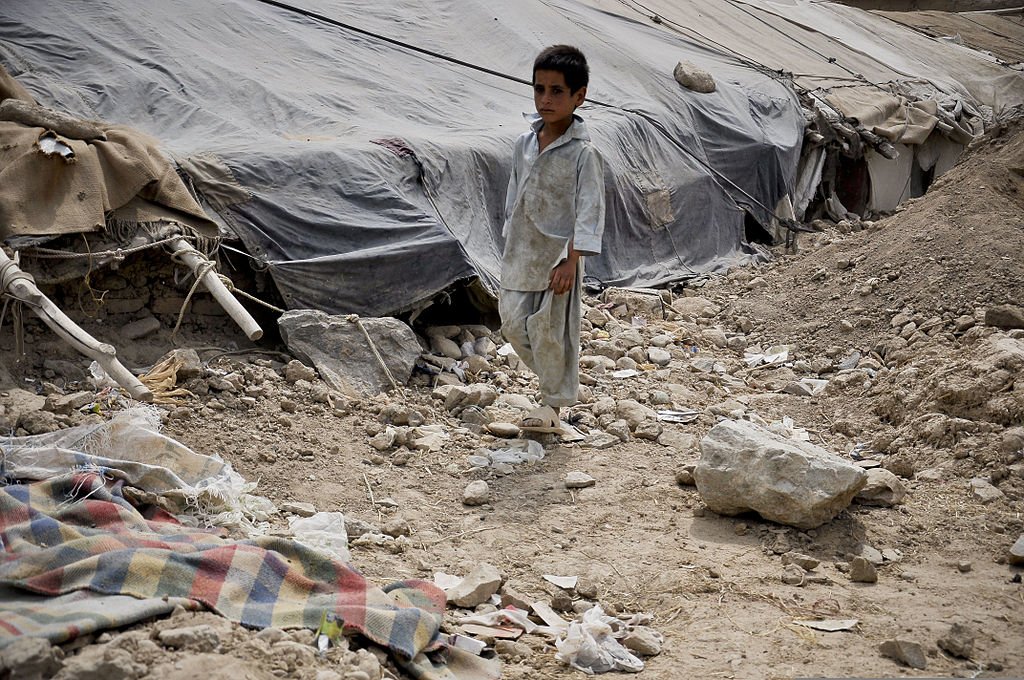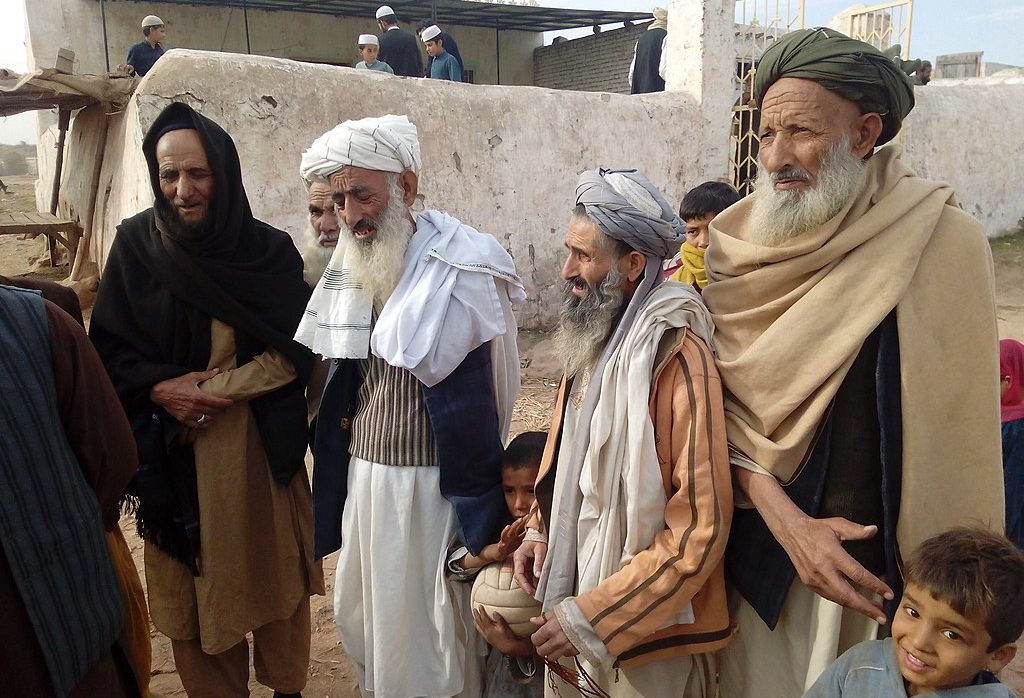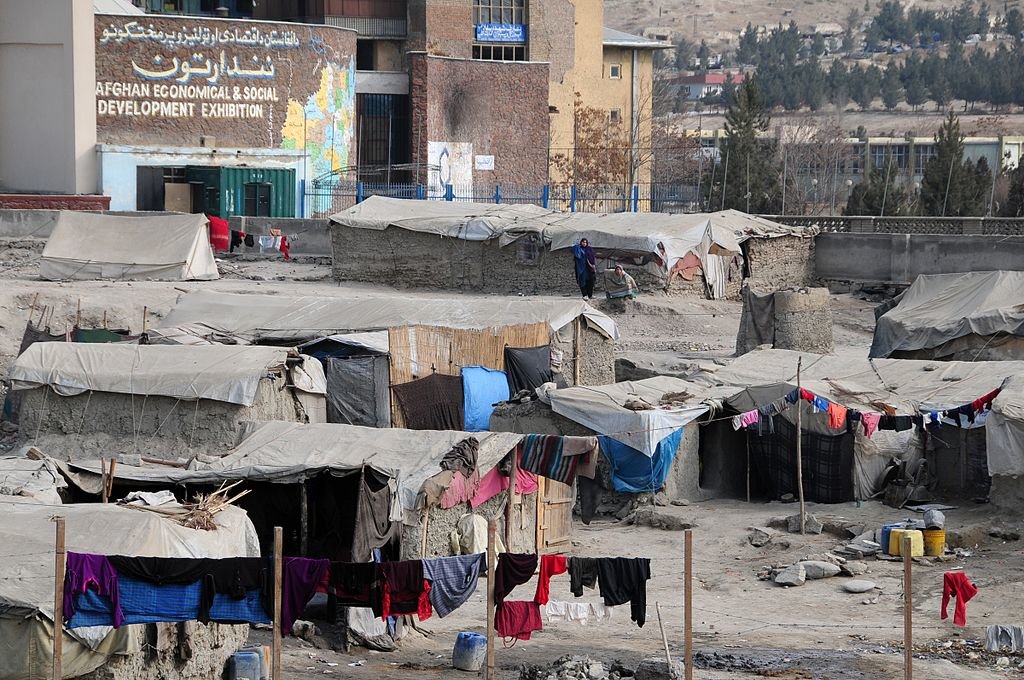
An Afghan boy walks in front of one of the many makeshift homes at a refugee camp in Kabul, Afghanistan. Afghans seeking to flee more than 40 years of war in Afghanistan can count Pakistan out as a destination. US Air Force photo by Senior Airman Christopher Hatch, courtesy of Wikimedia Commons/public domain.
As US Central Command reported Tuesday that more than 95% of the American withdrawal from Afghanistan is complete, it was unclear where Afghan refugees, particularly interpreters and others who fought alongside US forces, would end up. Pakistan is ruling itself out as a potential landing spot for the estimated 70,000 Afghans backlogged in the US Special Immigrant Visa process, according to Voice of America.
“We are willing to help but we are in no position to take in new refugees this time around,” Pakistan’s National Security Adviser Moeed Yusuf told VOA. “The international forces and the U.N. should make arrangements for them inside Afghanistan.”
According to Amnesty International, Pakistan currently hosts more than 1.5 million registered Afghan refugees and at least another 1 million unregistered Afghans.

Afghan refugees began arriving in Pakistan as early as the Soviet invasion of Afghanistan in 1979. VOA estimates their numbers at approximately 3 million. According to Pakistani officials, the porous border with Afghanistan places Pakistani security at risk.
“There are fears that members of the banned terror outfits like the Tehrik-e-Taliban Pakistan (the TTP or Pakistani Taliban) might enter Pakistan from Afghanistan in the guise of refugees and create unrest in the country,” Yusuf told VOA.
For more than 40 years, Pakistan has dealt with Afghanistan being in constant turmoil, resulting in refugees and militants crisscrossing the Pakistan-Afghanistan border. As a result, Pakistan has fenced off nearly 90% of its 1,640-mile border with Afghanistan in an attempt to both prevent and consolidate border crossings.

According to VOA, Pakistani intelligence briefed the Parliament of Pakistan earlier this month on the prospect of a new civil war in Afghanistan. In that scenario, the Pakistani government projects that some 700,000 new refugees would attempt to enter Pakistan in the first year alone — a situation that would require United Nations intervention, according to Islamabad officials.
“If such a situation arises, then the United Nations refugee agency, UNHCR, should set up camps for the refugees on the Afghan side of the border,” Yusuf said.
On June 29, the US House of Representatives passed a bill from Rep. Jason Crow, a Colorado Democrat and former Army Ranger, which would expedite the visa process for Afghan interpreters. However, it still needs to pass in the Senate. “I will continue to work closely with the Administration to honor our promises and protect the partners who stood alongside us,” Crow said in a release.

James Webb served as a US Marine infantryman from 2005 to 2010, completing a combat tour in Iraq. He’s worked as a freelance writer and photojournalist covering US troops in Afghanistan, and Webb spent more than two years in the US Senate as a military legislative assistant and as the personal representative of a member on the US Senate Foreign Relations Committee.
BRCC and Bad Moon Print Press team up for an exclusive, limited-edition T-shirt design!
BRCC partners with Team Room Design for an exclusive T-shirt release!
Thirty Seconds Out has partnered with BRCC for an exclusive shirt design invoking the God of Winter.
Lucas O'Hara of Grizzly Forge has teamed up with BRCC for a badass, exclusive Shirt Club T-shirt design featuring his most popular knife and tiomahawk.
Coffee or Die sits down with one of the graphic designers behind Black Rifle Coffee's signature look and vibe.
Biden will award the Medal of Honor to a Vietnam War Army helicopter pilot who risked his life to save a reconnaissance team from almost certain death.
Ever wonder how much Jack Mandaville would f*ck sh*t up if he went back in time? The American Revolution didn't even see him coming.
A nearly 200-year-old West Point time capsule that at first appeared to yield little more than dust contains hidden treasure, the US Military Academy said.












